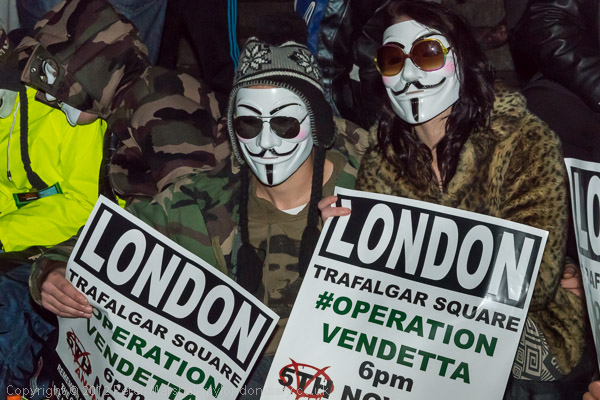
Despite some rumours I wasn’t around to photograph Guy Fawkes as he made his way into Parliament, but I was there in 2012 when ‘Anonymous’ wearing Guy Fawkes masks popularised in the graphic novel and film ‘V for Vendetta’ chose November 5th 2012, Bonfire Night, for their “worldwide Anonymous operation of global strength and solidarity, a warning to all governments worldwide that if they keep trying to censor, cut, imprison, or silence the free world or the free internet they will not be our governments for much longer.”
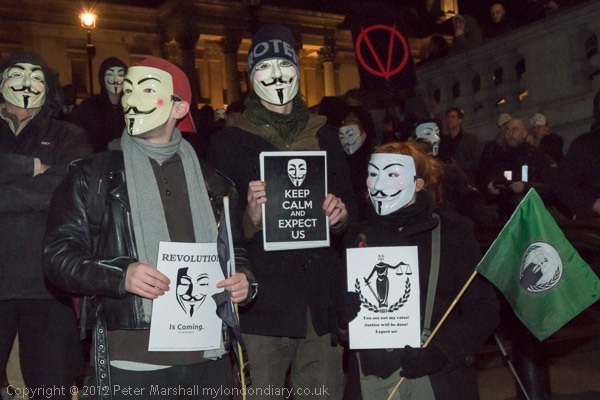
I wrote a fairly long account of the night, or at least those parts I witnessed, on My London Diary at Anonymous March to Parliament where you can also see many more pictures, and I won’t repeat the details here, but it is worth restating the aims of the protest:
In the UK the protest called for an end to cuts in education, health and welfare and the end of ‘austerity measures’ that target the poor and vulnerable, calling on the government to tackle the causes of the problems, including the banks and tax avoidance and evasion. They also want freedom for the Internet, with respect for the privacy of Internet users and the dropping of the Communications Data Bill.
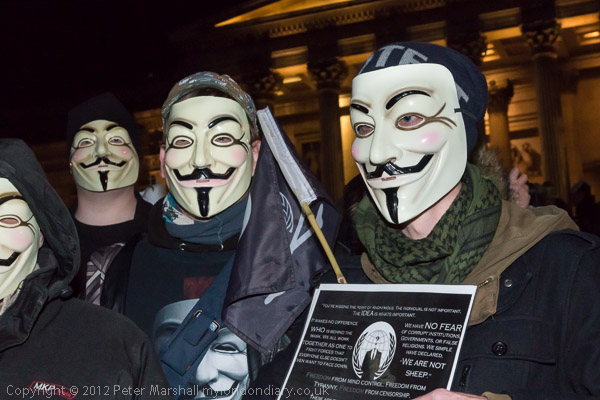
My account also mentions that:
Anonymous also asks for Internet activists who are held as political prisoners to be released, including Julian Assange currently still unable to leave a London embassy, Richard O’Dwyer, the “PayPal 14, Jeremy Hammond, Topiary and the 4 anons of the UK that will stand trial on November 7th.”
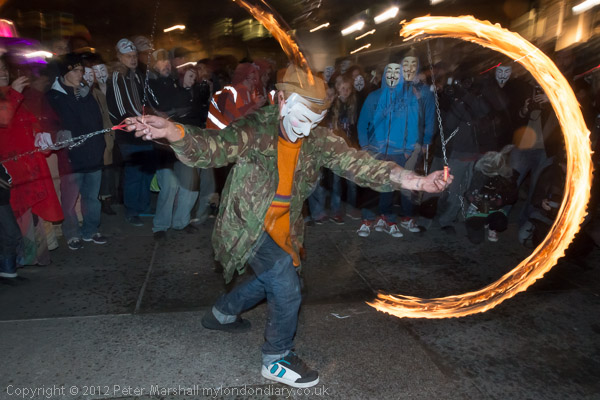
Everyone will be aware of some of what is still now taking place over Assange, including a CIA plot to kidnap him from the Ecuadorian embassy, then the Ecuadorian government withdrawal of his immunity, calling in the police to remove him, since when he has been kept largely in isolation in the high-secuirty Belmarsh prison as the US authorites continue to press for his extradition. The US appeal last week against a previous court decision that he could not be extradited because of this mental health and the likelihood that he would commit suicide has been largely the subject of a news blackout by the British media.
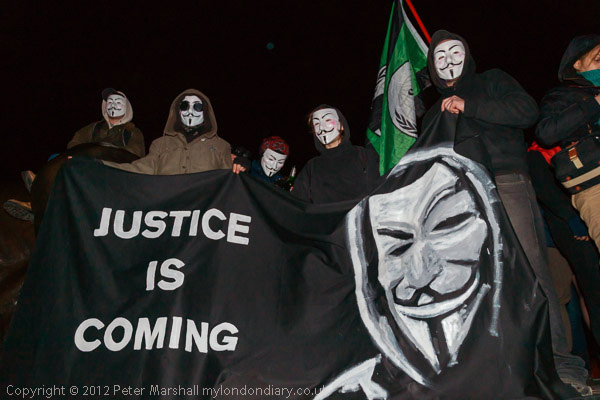
But the other cases have probably faded from most of our memories – if we were ever aware of them, so here are some brief reminders with information from Wikimedia.
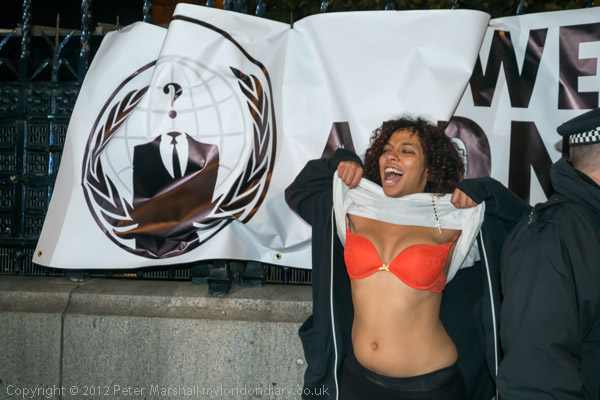
Richard O’Dwyer created a web search engine which linked to copyright infringing sites and was charged in New York with conspiracy to commit copyright infringement and criminal infringement of copyright. He fought against extradition, but after Theresa May as Home Secretary ruled he could be sent to the US to face charges in November 2012 signed a deferred prosecution agreement, paying a £20,000 fine for charges to be dropped.
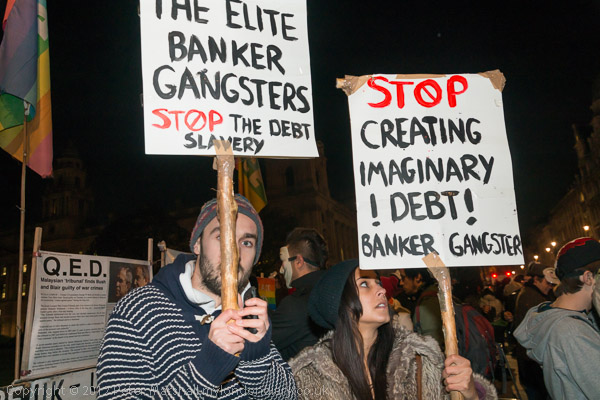
The PayPal 14 were charged under the Computer Fraud and Abuse Act in July 2011 for attempted denial of service attacks on Paypal in 2010 after it refused to make payments to a Wikileaks account, in what they say as a digital ‘sit-in’. Most later pleaded guilty to misdemeanours to avoid more serious charges and were sentenced to probation with 13 sharing a fine of $6,615 each.
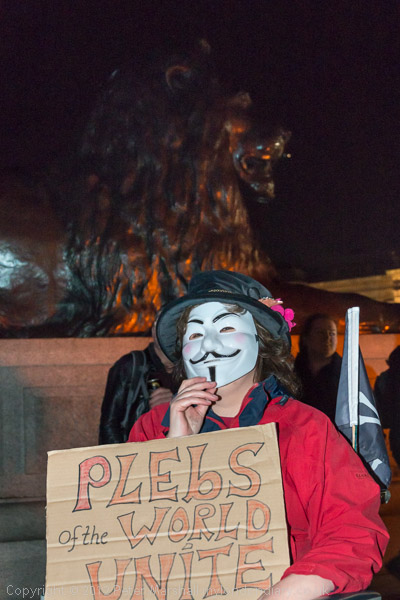
American activist and computer hacker Jeremy Hammond was sentenced to two years in hail for hacking a US pro-Iraq war group in 2005. In December 2011 he was involved in a hack of private intelligence firm Stratfor, which compromised 60,000 credit cards and downloaded 5 million emails, some later published by Wikileaks. Identifying himself as anarchist-communist he defended his actions saying “I did what I believe is right” and was sentenced to the maximum penalty of 10 years in jail. He was released under supervision in November 2020, having been kept in jail longer for refusing to testify to a grand jury investigation into Wikileaks and Julian Assange.
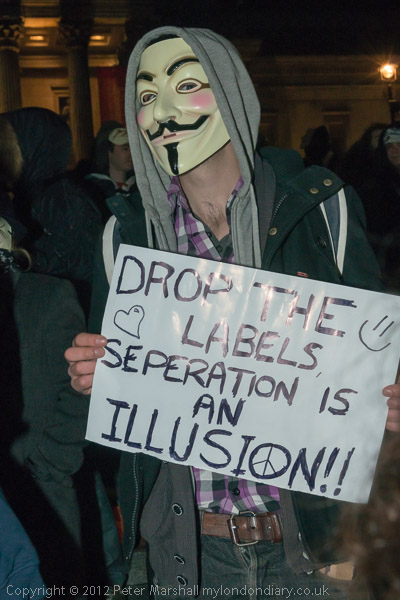
Topiary, British hacktivist Jake Davis, was a member of Anonymous and LulzSec, involved in various online attacks including defacing the goverment websites of Zimbabwe, Syria, Tunisia, Ireland, and Egypt as well as the Westboro Baptist Church. Then aged 18, he was arrested in 2011 at his home in the Shetlands and charged with offences including a conspiracy to launce a denial-of-service attack against the Serious Organised Crime Unit. Tried with three fellow hackers (I think probably the 4 anons of the UK referred to by Anon) in 2013 he pleaded guilty and was sentenced to 24 months in a young offenders institute, with the 21 months he had been electronically tagged before the sentence being counted against it.
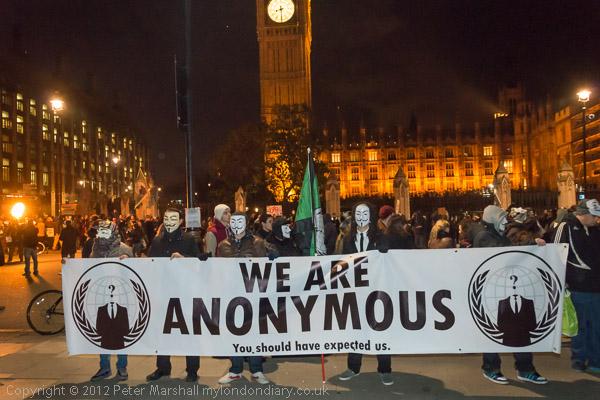
Anonymous hackers were also responsible for a number of successful attacks on child pornography sites, and actions against Scientology, a cult they saw was causing harm to many followers. They say “Distributed Denial of Service must be recognised as a legitimate form of protest, as long as an aim and reason has been specified by the protestors.“